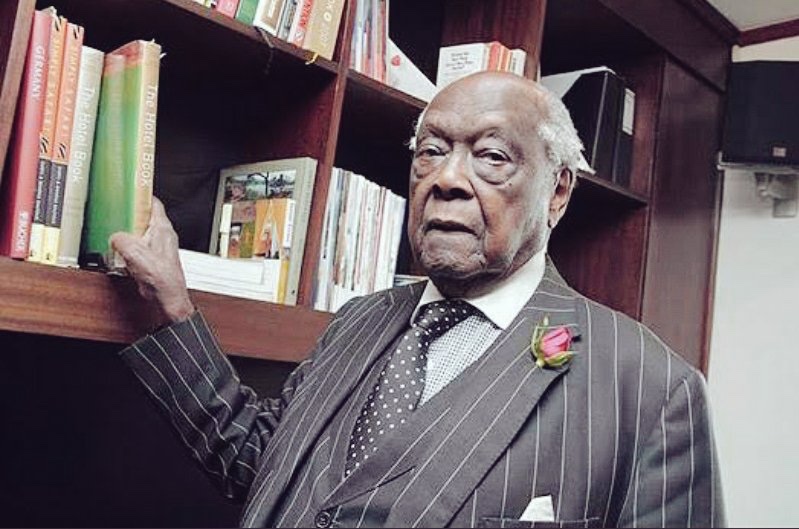When an Italian fashion designer, Giorgio Armani, said the difference between style and fashion is quality, Charles Njonjo must have been in his mind.
The former Attorney General and Cabinet minister Charles Mugane Njonjo had a deep desire to espouse class, fine living and elegance.
Njonjo died on Sunday aged 101. He was the only surviving member of Kenya’s independence Cabinet.
The former Attorney has been a loyal adherent to designer suits and spoke the Queen’s language with perfect diction.
A son of Senior Chief Josiah Njonjo in a family of eight, Njonjo’s life was characterised by affluence and power.
Njonjo, the ‘Duke of Kabeteshire’, is famous for the striped suits he used to buy only in London, worn with his signature red rosebud in his lapel.
He never shied away from talking about his suit.
“All I can tell you and my advice is to go to Savile Row in London and you will get the same,” he told Jeff Koinange in an interview.
A quick search at a suit-making company in Savile Row in London called Mullen and Mullen gives some insights.
The company makes made-to-measure two/three-piece suits, bespoke shirts and Italian-made shoes, ties and belts.
A two-piece suit package is worth £1,599 (Sh243,376), while a three-piece suit package costs £1,799 (Sh273,817).
A Tuxedo, Dinner Suit, Dinner Jacket or a DJ at Zebel Bespoke goes for £599.00 (Sh91,170).
The former Attorney General was a formidable, powerful figure in Kenyan history, and especially the Independence era, when he wielded enormous influence.
At some point, he was asked his thoughts about the state of the nation.
“I miss the discipline of that time. I miss the power I had, the power I could use for the common good. I miss the nation we had then, a strong nation,” he said.
When asked if he drank alcohol, he said: ” I don’t drink much. If I’m to drink, it will be just a bottle of beer and maybe a cider, that is it.”
Njonjo was famous for his eloquence, English mannerisms and fondness for English culture, so fond he earned the informal and not entirely complimentary title ‘Sir’ Charles.
Njonjo had the ear of founding President Jomo Kenyatta and rode in his limousine.
This was because he wanted to ensure the government provided quality services to its citizens, which he said Mzee wanted.
Njonjo was instrumental in elevating Daniel Moi to vice president after Josephat Murumbi resigned in 1967.
He and Moi fell out in 1983, however, when Moi accused him of plotting to overthrow the government.
The no-nonsense former AG praised the initiative of consolidating personal details “as people will not be carrying many documents with them”.
So privileged was the former AG and so charmed his early years that Njonjo ate ugali for the first time after joining Alliance High School.
In those days, Njonjo rode a horse to school — at that time horses were the equine preserve of royalty — after weekend breaks.
At Alliance, he and other boys stood barefoot in assembly as they raised the Union Jack.
They wore only khaki shirts and shorts at Alliance. Njonjo had jiggers.
He dreaded the standard cold showers and the deprivation of meat every day that he enjoyed at home. It was served only twice a week at Alliance.
If life at Alliance was hard, Njonjo would later endure long trips on a congested train coach to get to Fort Hare University, South Africa.
This was at the height of apartheid and natives (blacks) were restricted to one uncomfortable coach, some filled with the stench of sweat and chicken poop.
The man who later became Kenya’s AG endured the extremes of apartheid, carrying with him memories of how he would be barred from dining halls.
On streets, in train stations and at train stops, blacks could not cross a white man or woman’s path.
Njonjo went to Kings College-Budo in Uganda in 1939 for a two-year pre-university course before he proceeded to the South African university.
He spent three years at Fort Hare and later moved to the UK for further studies, attending Exeter University and later the London School of Economics until 1950.
On his return to Kenya in 1954, Njonjo began his career in the justice system when the colonial government hired him as a High Court registrar.
He was promoted to Registrar General and later moved to the AG’s office as Senior Crown Counsel.
In 1962, Njonjo was promoted to Deputy Public Prosecutor — a step away from the Attorney General’s post, which he occupied after Jomo Kenyatta took over.
This would propel him to become an ex-officio Member of Parliament as Kabete MP and earned him a seat in the Cabinet.
He says he took his work so seriously that he married late, at age 52. He married a British woman.
His downfall was engineered by President Moi, who saw him as a threat. Previously, he supplied suitcases full of Savile Row suits to Moi.
Njonjo, who kept off politics during his retirement, had expressed concern that the quality of civil service has declined.
In one of his last public outings, Njonjo was featured in a video by the Ugandan Wildlife Authority, while tracking gorillas at the Mgahinga National Park.
There's no story that cannot be told. We cover the stories that others don't want to be told, we bring you all the news you need. If you have tips, exposes or any story you need to be told bluntly and all queries write to us [email protected] also find us on Telegram

